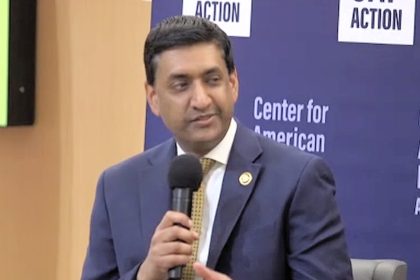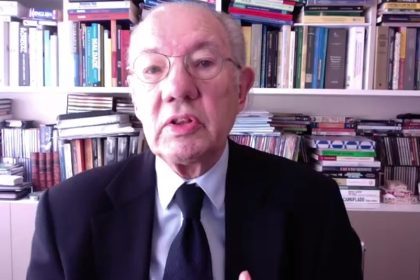Top US Environmental Diplomat Praises America’s ‘Can-Do Spirit’

WASHINGTON — In her last public event before taking on her new role as CEO of the Wildlife Conservation Society, Monica Medina told the Wilson Center she’s confident in the world’s ability to meet its global sustainability challenges thanks to environmental diplomacy, private sector partnerships and good old American ingenuity.
“We have to be hopeful and solve these problems with optimism and that can-do spirit that is so uniquely American,” Medina said during a conversation with the research organization’s Environmental Change and Security Program.
Currently Medina is wrapping up her tenure as assistant secretary for Oceans and International Environmental and Scientific Affairs at the State Department as well as the special envoy for Biodiversity and Water Resources.
Agreeing that climate change and biodiversity loss can be “overwhelming,” she also admitted that she “couldn’t be more optimistic, because I think we now have come to the recognition that we have to solve these challenges together. Multilateralism and diplomacy are absolutely essential to getting it right.”
Touting some successes from her time leading the OES Bureau, Medina specifically called out the “hugely ambitious goal” of launching global negotiations to end plastic pollution, the adoption of a Global Biodiversity Framework that will address biodiversity loss and restore ecosystems and the addition of 10 new signatories to the Artemis Accords — a foundation for cooperation in the civil exploration of the moon and Mars.
She is also pleased with a “historic and unprecedented” agreement reached on a draft text that covers biodiversity on the high seas as well as reviving the science envoy program, which she said was “an important part of how the U.S. reaches out to scientists around the world.”
“This is the first cohort in many, many years, and it includes the first … envoy at the nexus of environmental science and indigenous knowledge,” she said.
Medina is particularly proud that recent work has reinvigorated space and science diplomacy and allowed participants “the chance to really think about how we bring indigenous leaders, and front-line communities, and women into this conversation.”
The result has been the prioritization of large-scale biodiversity conservation through relationship-building, including bridges across government, civil society and the private sector.
“We offer the best of what is American to lead,” she said. “Our values help to build trust as does our history of environmental action.”
The last few years, especially, have been a crossroads for global conservation work.
“We could keep going on this business-as-usual path, or we could change our ways … choose a different way of proceeding into the future,” she said, offering that what is new now is, “a greater recognition of the connectedness of all of the issues that we put under the environmental umbrella.”
“What’s really changed is the sense that these problems are interconnected … and that we have this intergenerational responsibility in addition to this current responsibility.”
“With very robust nongovernmental organization[s] that bring people together in concert with the [bureaucratic] negotiations themselves, we’ll be able to bring a whole lot more voices in to solve the problem,” she said.
“One of the other big game changers has been the rise of large philanthropic organizations,” she said, citing organizations like the Bezos Earth Fund that have provided expertise and financing to “galvanize support for the work that we’re doing” and “help to make it seem more possible than it might have been before.”
As she prepares to leave her role in public service, Medina admitted that it has “really been an honor to … bring all of these things to light.”
“I have loved this job with all of my heart and soul,” she said. “[We have] made environmental diplomacy a priority … for [national] and foreign policy and I don’t think that’s going to change no matter who sits in this chair.”
You can reach us at [email protected] and follow us on Facebook and Twitter
























